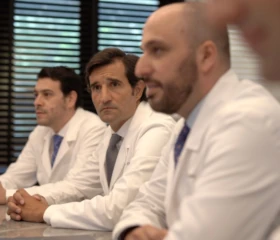Symptoms and causes Urinary Fistula
The symptoms of urinary fistulas are very bothersome.
To reverse this situation it is necessary to have the most advanced technology and to have surgeons approved for their intervention.
- Super-specialized urologists
- Personalized treatment
- Minimally invasive approach
- More than 16,000 patients successfully treated
Urinary Fistula Symptoms
Urinary fistulas have a great impact on the quality of life of the person who suffers from it. Among the main symptoms it produces are:
- Involuntary loss of urine.
- Expulsion of air with urine in relation to communication with the gastrointestinal tract.
- Repeated urinary tract infections.
- Emission of urine from the anus.
- Expulsion of feces through the urethra (fecaluria). Leakage of feces into the urine occurs in 40% of patients). Flow in the fistula occurs more in the direction from the bowel to the bladder.
- Urethral gas leakage (pneumaturia). Urinary gas leakage occurs in more than half of the cases (50%-60%), but can also be caused by infections by gas-producing organisms, especially in patients with diabetes or who have had urinary tract procedures, or in patients with diverticulitis.
- Pain above the pubic bone.
- Chronic skin irritation.
- Unpleasant odor.
Causes of Urinary Fistula
Normally, the urinary system is completely separate from the alimentary canal. When urinary fistulas appear they may be the result of:
- A malformation at birth (congenital) due to incomplete separation of the two systems during embryonic development.
- Prostate surgery: as a complication of prostate cancer treatment, especially after radical prostatectomy. Although other procedures on the prostate can also produce it to a lesser extent.
- Colon surgery.
- Digestive tumors (rectum, sigma).
- Radiotherapy.
- Inflammation, such as that caused by diverticulitis (inflammatory bowel disease) or Crohn's disease. Fistulas due to diverticular disease are more common in men.
- Infections.
- Trauma or foreign body.
- Interventions for urinary incontinence, placement of mesh for prolapse or removal of urethral diverticula.
- Gynecological tumors of the uterus, ovaries or vagina.
- Delivery.
They ask us in the Consultation
I expel gases through the urinary tract, is it serious?
The expulsion of gases through the urine may indicate the existence of a fistula of the urinary tract and the digestive tract. This is a communication between the two. In itself it is not serious. It may be associated with an increase in urinary tract infections. A proper study of the origin of the fistula is necessary, which may be related to urological processes such as previous surgeries or digestive processes such as infections or diverticulitis.
What happens if I have a urinary fistula and do not have surgery?
In case of urinary fistula, either with the vagina or the gastrointestinal tract, involuntary urine leakage or gas emission through the urethra may occur. If not operated, these symptoms do not disappear. Occasionally, fistulas may close spontaneously by placing a bladder catheter, but surgical intervention is usually required.
How long does it take for a urinary fistula to heal?
If the fistulas are not operated, the probability of spontaneous healing is low, although sometimes they can close with the placement of a bladder catheter. However, the time required is not short, requiring several weeks.
How can a urinary fistula be treated?
Treatment ranges from conservative maneuvers such as bladder catheterization to the need for surgery. The type of surgery depends on the origin and size of the fistula and may require a vaginal, abdominal or laparoscopic approach. In cases of fistulas from the urinary tract to the digestive tract, a colostomy may be required, i.e. a bag to collect the feces.
Team of the Urinary Fistula Unit
Newsof ROC Clinic in Urinary Fistula
Research
Current management of stage T1 renal cell carcinoma in Spain: Results of a multicenter national registry.


 +34 912 627 104
+34 912 627 104 Contact
Contact








